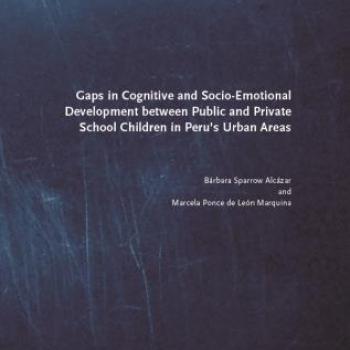
This study aims to identify and analyze gaps in cognitive and socio-emotional development between public and private school children in Peru's urban areas. The study uses data from Young Lives and has a mixed methods design. In the quantitative analysis, we apply a Propensity Score Matching (PSM) approach to compare cognitive and socio-emotional outcomes between private and public school children. In the qualitative analysis, we explore if differences in cognitive and socio-emotional development could be reflected in different children´s school experiences. Our results indicate that between the seven study cases analysed in Lima there are no evidence that supports these differences attributed to school type. We found that parents perceived private education as better than public education because of a general belief that private education is better, no matter what. Among the most important reasons given by parents for believing in the superiority of private education are the quality of teachers and the possibility that parents can demand better services because they are paying for it.

This study aims to identify and analyze gaps in cognitive and socio-emotional development between public and private school children in Peru's urban areas. The study uses data from Young Lives and has a mixed methods design. In the quantitative analysis, we apply a Propensity Score Matching (PSM) approach to compare cognitive and socio-emotional outcomes between private and public school children. In the qualitative analysis, we explore if differences in cognitive and socio-emotional development could be reflected in different children´s school experiences. Our results indicate that between the seven study cases analysed in Lima there are no evidence that supports these differences attributed to school type. We found that parents perceived private education as better than public education because of a general belief that private education is better, no matter what. Among the most important reasons given by parents for believing in the superiority of private education are the quality of teachers and the possibility that parents can demand better services because they are paying for it.

